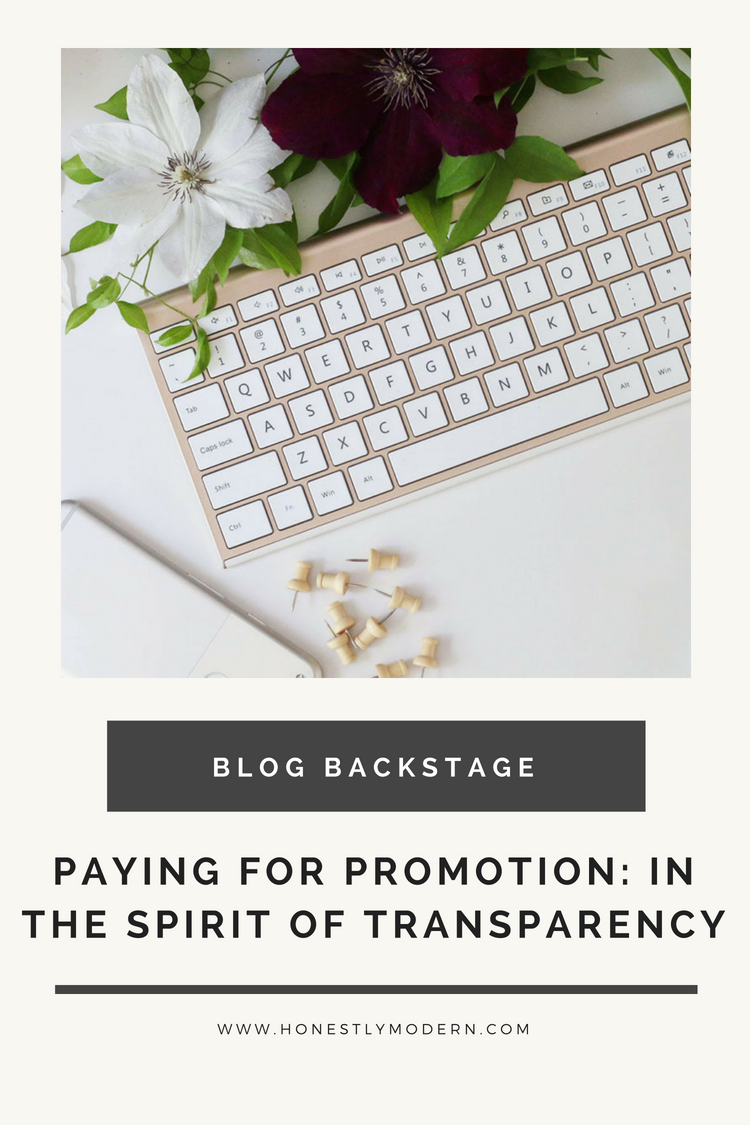Paying for Promotion: In The Spirit of Transparency
This is the 14th post in The Blog Backstage series about the Who, What, Where, When, Why and How behind Honestly Modern. Periodically, I share a peek behind the scenes about how and why all the magic happens to bring Honestly Modern to life. In this edition, I’m touching on financial investment, compensation for our services, and complexities of the technical side of blogging.

A little over 5 years ago, on March 31, 2013, I published my first blog post. I can’t believe this little side project has been alive that long!! I’ve since removed that first post to save hosting space and because it’s no longer relevant to my blog. The blog has had a few different names, changed domains, covered different topics, and grown in so many ways since I hit Publish on that first post about a pair of mustard yellow flats.
When I created my blog, I had no idea what I was getting into. I didn’t worry about it. Heck! I didn’t know enough to realize it might at times feel overwhelming. I just dove in head first because it sounded fun. It’s been growing and maturing ever since that day.
More Maturity & Sophistication Create More Value
As the blogging industry continues to mature and become a fixture in the online world, so too has the influence of diligent and trustworthy social media mavens grown. Influencer marketing, a fancy term for promoting products and services to targeted audiences of everyday people who have influence over their followers, has become a complex practice that nearly all companies pursue. Potential customers develop trust in a particular influencer and place more value on that person’s recommendations than the claims of blanket advertisements and commercials. Companies participate in influencer marketing because it works; it yields profitable returns.
And More Work
More sophisticated business partnerships between influencers and companies have come in tandem with increased complexity of managing an online space that is more technical, time-consuming, and expensive. For me, a lot goes into bringing the blog to life. Over the last five years, I’ve learned just enough about HTML website coding to be dangerous. I’ve spent countless hours learning the business side of social media and understanding how it works, what people like and why, so I can bring my best content to readers. I’ve taken photography courses to enhance my skills. There are a lot of skills required to manage a consistent blog.
I’m a bit of a nerd, and I really like digging into the technical side of blogging, but it takes a decent chunk of time to gather up the knowledge and resources I need to bring everything together. The increased “professionalism” of blogging, as more bloggers have made it a full-time career, and the increased amount of promotional partnerships throughout the space has also caught the attention of regulators. In recent years, the Federal Trade Commission (FTC) has issued a host of regulations surrounding disclosure of relationships that influencers have with brands and companies.
Big, Complex Regulations for Micro Influencers
These rules are complex and come with significant potential penalties. More importantly, there is no ‘de minimus’ threshold. The rules apply to influencers and companies of all sizes and to all promotions, no matter how big or small or how an influencer is compensated for sharing about a company’s product or service. As a relatively small blogger, this means I have to understand these rules and be diligent about implementing them accurately and completely. I have no qualms with transparency about partnerships I have with brands, but it’s definitely an undertaking to be sure I understand the rules and implement them correctly every time. I don’t have a legal team, marketing team, or editorial team checking my work to make sure I don’t miss anything. I’m all those “teams” for this space.
I thought the FTC rules were intimidating… then the European Union released the General Data Protection Regulation, or GDPR. What??! If you’ve seen a bunch of emails from brands you follow notifying you of new privacy policies, this is almost certainly a consequence of GDPR. The GDPR regulates how personal data (like your name, email address, and more technical information stored in your computer) is used and retained by companies. Many companies have entire departments dedicated to managing data and complying with GDPR.

Five years ago when I started this blog, I definitely didn’t anticipate having to understand and implement major global IT regulations. However, a meaningful portion of my readers come from Europe, which is really amazing, but also makes me subject to the rules of protecting personal information they provide when they use my site. Compliance with these rules is independent of partnering with brands. Just about every blogger is impacted by these rules.
All this is to say that influencers bring a lot of value to the companies they promote (and, presumably, to the audiences who follow them as well), particularly when we invest in a well-run and aesthetically-pleasing online space. We are also responsible for adhering to very complicated rules and regulations, and we dedicate a lot of time developing quality content that we are proud to share with our audiences.
So Why Do We Keep Getting Asked To Work For Free?
For all the time and financial resources that influencers invest in offering a valuable experience to our audiences, you might be surprised about how often we are asked to work for free. I get at least one email a day asking me to write about a particular company or product for nothing in return. I’m a tiny blogger by online standards; the larger bloggers get loads of these requests. By the time I’ve taken photos, written and edited a post, and tied all the pieces together, preparing a blog post takes a long time… usually 4 – 6 hours when all is said and done. But for an unusual circumstance when I really love a brand, why would I do this for free?
I write plenty of non-sponsored posts about all sorts of topics that I believe provide value to readers and that resonate with me, but I’m not so inclined to write a full-feature post about one company out of the goodness of my heart when I have a plethora of potential topics to cover.

It’s really important to me that the content I write feels relevant and meaningful to you, as the reader, so I am very diligent about doing my best to be sure that posts provide value to readers. When I work with brands, I also want to be sure they are brands I know and love so as not to dilute the trust you have in me related to the recommendations I make.
Requests to work for free are particularly rampant in ethical and intentional lifestyle spaces. Many of the companies asking for support serve some larger social mission, so they request assistance in spreading their message to help their beneficiaries.
I definitely believe in promoting social justice and supporting charities that are close to my heart, although I do believe more charities should be for-profit entities, but I digress. I donate to the charities that are important to me. I volunteer on the Board of Trustees and as the Treasurer for my local library, an organization whose mission really resonates with me. I also know that I have more privilege than just about all the beneficiaries of the social justice “for progress” enterprises requesting influencer support.
We can’t, however, all be donating our time and resources to every organization just because it has a noble cause. Additionally, many of the social enterprise companies, though they have social missions, are for-profit entities. Their employees are being paid, as they should be, so why shouldn’t their independent contractors be paid as well?
A Sustainable System Needs Reliable Funding
From a very practical perspective, any sustainable organization (a non-profit, a for-profit company, a union, an advocacy group, a family, a church, etc…) needs reliable funding. It costs money to operate, so being paid for our work is necessary to ensure the network of ethical lifestyle influencers is sustainable. If ethical companies want a bullpen of reputable advocates for their products, they need to help fund that network by paying the voices that make up the syndicate. If not, it will eventually wither and disappear.
Most ethical lifestyle bloggers pursue their work as full-time employment that is a primary source of income to pay for groceries and rent. If they can’t pay their bills, they’ll understandably spend their time elsewhere on more profitable endeavors.
Running a blog requires financial investment, the costs of which need to be covered (at the very least) when promoting other people’s products and missions. The best blogs, the ones that really drive sales, spends thousands of dollars a year on computer and technical equipment, cameras and other photography gear, software and hosting, and more. No one, or at least not a meaningful contingent of skilled influencers, will invest thousands of dollars and hundreds of hours of their time working for free. It won’t last.
For those of us, like myself, who manage an online presence as a side project around other employment, our blogs are not our first priority. There’s nothing wrong with a hobby blog. Mine teeters between a hobby and business, though I make barely enough to cover the cost of maintaining it, so it’s definitely not a profitable business. My “hourly wage”, if it’s even fair to call it that, is negligible. I have a corporate job that is my primary source of income, which also means it’s my primary professional commitment. That’s just the reality of life.

From one of my favorite posts, and it just happened to be sponsored.
I’m not suggesting a hobby blogger always produces less professional or less valuable content. When I commit to a partnership with a brand, I fully recognize the business nature of the relationship and treat it as such. But I can’t dedicate the same time to my blog as a professional, full-time blogger does. I will certainly meet the requirements of our agreement, but I might have delayed responses to email. I might not be able to promote the collaboration as actively after it launches. I can’t attend live events to build my personal brand (and thus increase the authority with which I promote your products) with the same frequency as someone who commits full-time to their online space.
If you’re relying on hobby bloggers to spread your message, you’re going to get what you paid for. Some (like myself) will fully follow through on our commitments. But some will burn you, and because it’s just a hobby, it won’t always matter much to the blogger. Beyond some sweat equity, we just don’t have that much to lose.
With respect to sustainability in an emotional context, compensation for our work helps us validate the time spent working on the blog to family and friends. Managing a consistent and beautiful blog takes a lot of time. Most people outside of the blogging industry totally don’t understand what we do. I get more cross-eyed looks and rolling eyes than I can count about my blog being anything more than a silly side project.
Getting paid for our efforts absolutely validates to others that what we spend so many hours creating is more than an arts and crafts project. Ultimately, when our family and friends support our “weird passion project”, we’re much more likely to stick it out and produce a blog with longevity and authority (which is paramount to the brands hoping to ride the tailwinds of our influence).
All this may sound petty when compared to the circumstances of those being served by the social enterprise companies, but quality messaging about ethical companies’ products just isn’t sustainable if they aren’t willing to invest in spreading their message. It takes money to make money.
Aren’t There Other Ways To Make Money?
Some might argue that we should still feature small up and coming brands because they don’t have budgets and are serving good missions. I’m not opposed to highlighting, at times, a brand I really love. It’s different, however (in my opinion), when a brand approaches me and asks me to write about them for free (as opposed to me falling in love with a brand and just happening to share my great experiences).
My initial, and very caddy, response is to retort that no one is writing feature articles about me just because I asked, and I write about social enterprise brands, caring for the environment, and other ethical topics. I’ve been responsible for finding an audience for my brand without a budget, and I’ve never felt entitled to free press coverage just because I can’t afford to pay for it.
In days of yore, bloggers, magazines, newspapers and other media outlets made money through advertising. Effectively, advertising subsidized the marketing budgets of companies in search of free press coverage.
The media market is changing and advertising, for the most part, isn’t a sustainable source of income. Newspapers are consolidating or moving toward donation models. Product placement and sponsorship are growing like mad in the movie and television industries. Aside from the Superbowl, no one watches commercials anymore, so halftime shows, on-screen score boards, and even replays in sports games are sponsored. Sponsorship is a growing model as advertising proves less successful, and this is true in and outside the online influencer space. More than just bloggers understand that sponsorship is an effective and legitimate way to support a work stream.
But for Google and those handful of influencers with millions of unique viewers, banner ads don’t provide any material income. Further, those celebrity-caliber bloggers with massive followings probably aren’t the best avenues for promotion, especially for small ethical brands. The influencers don’t appeal to an ethical brand’s target audience, and their readers don’t trust them the same way an audience trusts a micro-influencer. Celebrity-size influencers generally don’t provide the same return on investment. The best influencer advocates for ethical brands are most likely the bloggers who make but pennies on advertisements, so subsidizing small social enterprise marketing budgets with online banner ads on a blogger’s website no longer works.
Ultimately, not paying promoters to promote your products is not sustainable. Cash is king, and it will call the most skilled writers and creatives to work for it. If companies, and especially ethical companies, want reputable advocates for their products who will build lasting and influential relationships with their readers (and thus, drive more sales of their products), those influencers need to be paid. Otherwise, blogging never becomes anything more than a silly side project that will eventually fade away when something more profitable consumes the writer’s time. After all, love for our blogs and admiration for cool brands don’t keep the lights on or put food on the table.
It’s Still More Than Money
Just because ethical bloggers receive compensation for the extensive time and effort we put forth selling another brand’s products doesn’t discredit our trustworthiness or authenticity. The best bloggers, the ones you want to hire who will successfully promote your products, turn down plenty of paid offers from brands. Maintaining our credibility with their readers by not recommending crappy or unethical products is just as important as making money for the work we do. Readers are smart enough to sniff out a blogger who consistently prioritizes payment over quality and authenticity. That influencer will quickly lose the trust of their audience and readers will find other, more credible bloggers to follow.
Make Your Product So Good It’s Impossible To Ignore
I have one last parting thought that I come back to time and again when pondering how any business owner can garner more clients or customers. We worry so much about our message and our communication channels. But maybe we should stop worrying so much about crafting ‘the right’ message or seeking out ‘the right’ channel, and focus instead on providing such an amazing product or service that everyone who experiences it wants to shout from the rooftops about it. Word of mouth is the best method of promotion. If your product is so wonderful, you won’t need to force the message into potential customer’s faces. Instead, they won’t be able to ignore it when it crosses their path. Maybe that should be the main goal? Then maybe you don’t even need to pay bloggers to have products flying off the shelves?
More Thoughts On The Matter
Several other members of Ethical Writers and Creatives have shared their thoughts on this topic. They’ve taken different angles more specific to their particular circumstances and sets of beliefs. In the end, however, we all understand that a network of voices to review, validate and promote our favorite ethical brands isn’t sustainable without being paid for our efforts. We invested in our platforms to support growth, and we expect our partners to invest in relationships with us if they want us to help them grow as well.
Be sure to stop by the other EWC writers who’ve shared their perspectives on this topic.
Bless You, Pay Me: The 11 Non-Negotiable Reasons Why You Need to Pay Influencers for Coverage | Alden from EcoCult
The Business of Blogging: Why Fair Trade Rhetoric Must Include Bloggers | Leah from Style-Wise
Working With Bloggers & Brands: A Mini Guide | Francesca from Ethical Unicorn
Why Bloggers Should Be Paid Fairly | Holly from Leotie Lovely
My Role as an Influencer – Working with Brands and Why It Matters to You | Cait at World Threads Traveler








